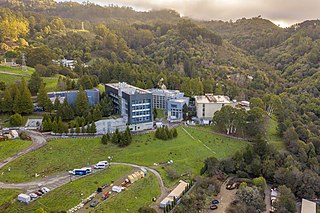
Lawrence Berkeley National Laboratory (LBNL) is a federally funded research and development center in the hills of Berkeley, California, United States. Established in 1931 by the University of California (UC), the laboratory is sponsored by the United States Department of Energy and administered by the UC system. Ernest Lawrence, who won the Nobel prize for inventing the cyclotron, founded the Lab and served as its Director until his death in 1958. Located in the Berkeley Hills, the lab overlooks the campus of the University of California, Berkeley.
The Geballe Laboratory for Advanced Materials (G-LAM) at Stanford University supports research on advanced materials. Major research foci include information storage materials.
Engineering physics, or engineering science, refers to the study of the combined disciplines of physics, mathematics, chemistry, biology, and engineering, particularly computer, nuclear, electrical, electronic, aerospace, materials or mechanical engineering. By focusing on the scientific method as a rigorous basis, it seeks ways to apply, design, and develop new solutions in engineering.

The United States Department of Energy National Laboratories and Technology Centers is a system of laboratories overseen by the United States Department of Energy (DOE) for scientific and technological research. The primary mission of the DOE national laboratories is to conduct research and development (R&D) addressing national priorities: energy and climate, the environment, national security, and health. Sixteen of the seventeen DOE national laboratories are federally funded research and development centers administered, managed, operated and staffed by private-sector organizations under management and operating (M&O) contracts with the DOE.
Malcolm Roy Beasley is an American physicist. He is Professor Emeritus of Applied Physics at Stanford University. He is known for his research related to superconductivity.
Michael Ellis Fisher was an English physicist, as well as chemist and mathematician, known for his many seminal contributions to statistical physics, including but not restricted to the theory of phase transitions and critical phenomena. He was the Horace White Professor of Chemistry, Physics, and Mathematics at Cornell University. Later he moved to the University of Maryland College of Computer, Mathematical, and Natural Sciences, where he was University System of Maryland Regents Professor, a Distinguished University Professor and Distinguished Scholar-Teacher.
The Stanford Institute for Theoretical Physics (SITP) is a research institute within the Physics Department at Stanford University. Led by 16 physics faculty members, the institute conducts research in High Energy and Condensed Matter theoretical physics.
Alexander L. ("Sandy") Fetter is an American physicist and Professor Emeritus of Physics and Applied Physics at Stanford University in California. His research interests include theoretical condensed matter and superconductivity.

John C. Browne is an American physicist.
The Office of Science is a component of the United States Department of Energy (DOE). The Office of Science is the lead federal agency supporting fundamental scientific research for energy and the Nation’s largest supporter of basic research in the physical sciences. The Office of Science portfolio has two principal thrusts: direct support of scientific research and direct support of the development, construction, and operation of unique, open-access scientific user facilities that are made available for use by external researchers.
The Richtmyer Memorial Award is an award for physics education, named for physicist Floyd K. Richtmyer and given annually by the American Association of Physics Teachers. Its recipients include over 15 Nobel Prize winners.
Kathryn Ann Moler is an American physicist, and current dean of research at Stanford University. She received her BSc (1988) and Ph.D. (1995) from Stanford University. After working as a visiting scientist at IBM T.J. Watson Research Center in 1995, she held a postdoctoral position at Princeton University from 1995 to 1998. She joined the faculty of Stanford University in 1998, and became an Associate in CIFAR's Superconductivity Program in 2000. She became an associate professor at Stanford in 2002 and is currently a professor of applied physics and of Physics at Stanford. She currently works in the Geballe Laboratory for Advanced Materials (GLAM), and is the director of the Center for Probing the Nanoscale (CPN), a National Science Foundation-funded center where Stanford and IBM scientists continue to improve scanning probe methods for measuring, imaging, and controlling nanoscale phenomena. She lists her scientific interests and main areas of research and experimentation as:
Theodore Henry Geballe was an American physicist who was a professor of applied physics at Stanford University. He was known for his work on the synthesis of novel materials of interest to several areas of physics and many interdisciplinary sciences.

Laura H. Greene is the Marie Krafft Professor of Physics at Florida State University and chief scientist at the National High Magnetic Field Laboratory. She was previously a professor of physics at the University of Illinois at Urbana-Champaign. In September 2021, she was appointed to the President's Council of Advisors on Science and Technology (PCAST).
The Richard Glazebrook Medal and Prize is awarded annually by the Institute of Physics to recognise leadership in the field of physics. It was established in 1966 and named in honour of Sir Richard T. Glazebrook, the first president of the Institute of Physics. It was originally a silver medal with a £250 prize.
Zhi-Xun Shen is a Chinese-American experimental and solid state physicist who is a professor at Stanford University. He is particularly noted for his ARPES studies on high-temperature superconductors.
M. Zahid Hasan is the Eugene Higgins Professor of Physics at Princeton University. His primary research area is quantum physics and quantum topology.
Aharon Kapitulnik is an Israeli-American experimental condensed matter physicist working at Stanford University. He is known primarily for his work on strongly correlated electron systems, low dimensional electronic systems, unconventional superconductors, topological superconductors, superconductivity and magnetism, transport in bad metals and precision measurements.
Harold Yoonsung Hwang is an American physicist, specializing in materials physics, condensed matter physics, nanoscience, and quantum engineering.




